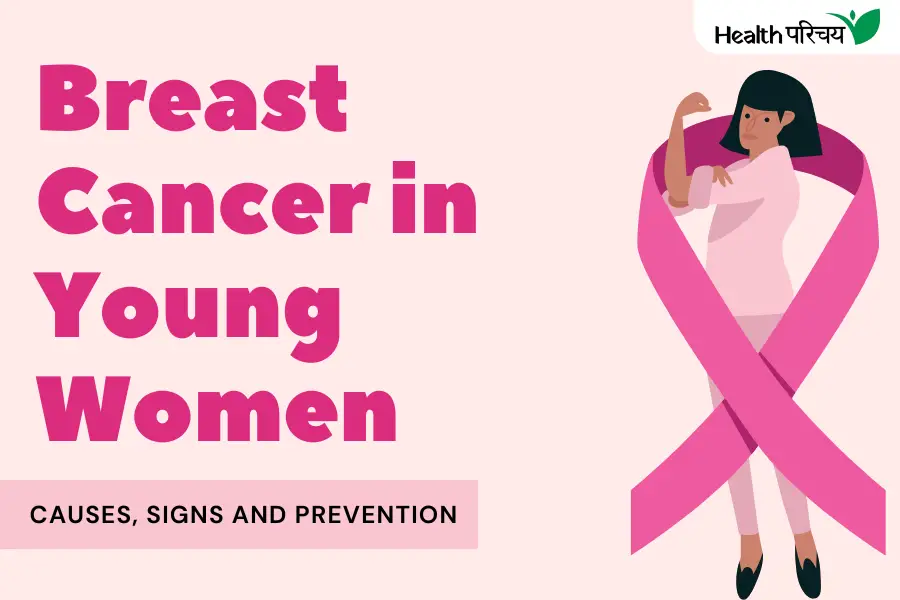Breast cancer is no longer a condition associated only with older women. With changing lifestyles, hormonal imbalances, and delayed motherhood, the risk of breast cancer is rising even among women in their 30s and 40s. This alarming trend has made it crucial to understand the causes and risk factors, especially for young women, to enable early detection and prevention.
Rising Cases of Breast Cancer in Young Women
According to a report by the Indian Council of Medical Research (ICMR), breast cancer accounted for the highest number of cases among the 14 lakh cancer diagnoses in 2020. What’s concerning is the increasing prevalence of this disease among women as young as 30-40 years. Factors such as unhealthy lifestyles, poor dietary habits, lack of physical activity, hormonal imbalances, and family history are some of the key contributors to this worrying trend.
Check Out: Understanding Breast Cancer

Major Causes of Breast Cancer in Young Women
1. Poor Lifestyle Choices
The modern lifestyle, characterized by irregular eating habits, consumption of processed foods, lack of sleep, and minimal physical activity, is one of the leading causes of breast cancer in young women. Junk food and obesity can disrupt hormonal balance, significantly increasing the risk.
2. Hormonal Imbalance
Hormonal imbalances, particularly in estrogen and prolactin levels, are closely linked to breast cancer. Late marriages and delayed motherhood disturb the hormonal equilibrium, further raising the chances of developing this disease.
3. Family History and Genetic Factors
A family history of breast cancer plays a significant role. Women with a genetic predisposition, especially mutations in the BRCA1 and BRCA2 genes, are at a higher risk. Regular screenings and genetic counseling can help in early detection.
4. Lack of Awareness
One of the most overlooked causes is the lack of awareness among young women. Many fail to recognize the early symptoms of breast cancer, such as unusual lumps, changes in breast size, or skin texture, leading to late diagnosis when the disease has already advanced.
5. Late Pregnancy or No Pregnancy
Delayed pregnancy or opting out of motherhood alters the natural cycle of estrogen exposure, making women more vulnerable to breast cancer. Early pregnancy and breastfeeding are known to offer a protective effect against the disease.
6. Exposure to Environmental Toxins
Young women are increasingly exposed to harmful environmental toxins and pollutants, including endocrine-disrupting chemicals, which can lead to cellular damage and increase the likelihood of cancer.
Also Read: How to Naturally Detox Your Skin for a Healthy Glow

Early Warning Signs of Breast Cancer
- Unusual lump or thickening in the breast or underarm
- Changes in the size or shape of the breast
- Pain in a specific area of the breast that doesn’t go away
- Redness, scaling, or dimpling of the breast skin
- Nipple discharge that is not breast milk
- Inverted or retracted nipples

Prevention and Early Detection
1. Adopt a Healthy Lifestyle
- Maintain a balanced diet rich in fruits, vegetables, whole grains, and lean proteins.
- Avoid processed foods, sugary drinks, and trans fats.
- Include at least 30 minutes of physical activity daily to maintain a healthy weight.
2. Self-Examination and Awareness
- Conduct regular breast self-examinations to detect any unusual changes.
- Learn about early warning signs and consult a doctor immediately if any abnormality is noticed.
3. Regular Medical Screenings
- Women with a family history of breast cancer should start mammography and ultrasound screenings early.
- BRCA genetic testing can identify inherited risks.
4. Hormonal Balance
- Avoid prolonged use of hormonal contraceptives without medical advice.
- Opt for natural methods to balance hormones, such as yoga and stress management techniques.
5. Limit Alcohol and Smoking
- Excessive alcohol consumption and smoking are known risk factors for breast cancer. Reducing or eliminating these habits can significantly lower the risk.
6. Breastfeeding
- Breastfeeding reduces the risk of breast cancer by lowering estrogen levels and promoting healthy hormonal changes.
Conclusion
The increasing cases of breast cancer among young women demand immediate attention and proactive measures. While genetic predisposition and hormonal factors may be unavoidable, lifestyle changes, regular screenings, and early detection can significantly reduce the risk. Awareness and education are the first steps toward protecting yourself and your loved ones from this life-threatening disease.







Leave a Reply